Having troubles from the small painful red bump on your skin? Feeling feverish and suffering from tiredness? You may be having Necrotizing Fasciitis, a medical syndrome that needs immediate medical attention.
What is Necrotizing Fasciitis?
Page Contents
- 1 What is Necrotizing Fasciitis?
- 2 Necrotizing Fasciitis Symptoms
- 3 Necrotizing Fasciitis Causes
- 4 Is Necrotizing Fasciitis Contagious?
- 5 Who gets Necrotizing Fasciitis?
- 6 Necrotizing Fasciitis Prevention
- 7 Necrotizing Fasciitis Diagnosis
- 8 Necrotizing Fasciitis Treatment
- 9 Necrotizing Fasciitis Pictures
- 10 Necrotizing Fasciitis Statistics
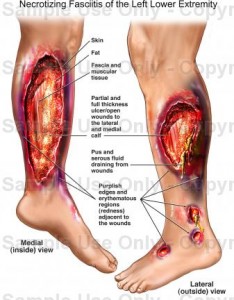
Picture 1 -Necrotizing Fasciitis
Source – nucleousinc
Necrotizing Fasciitis is a kind of bacterial skin infection that is known as Flesh-eating syndrome or Flesh-eating disease. It is a condition in which there is an infection of the deeper skin layers and subcutaneous tissues. Generally the infection can arise in any part of the body. It mainly begins in the fascial planes of connective tissues. It leads to a necrosis (death or damage) of the tissues. The infection rapidly spreads to other parts of the body.
Necrotizing Fasciitis Symptoms
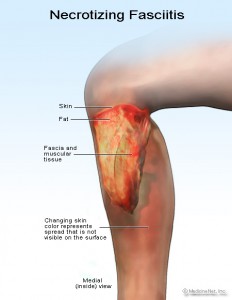
Picture 2 – Necrotizing Fasciitis Picture
Source – effguide
The disorder is characterized by a number of symptoms like :
Pain
A recently injured body part may begin causing much more pain than it should in normal circumstances.
Red Streaks
Red streaks may appear around the wound of the suffering person.
Pus
The wound may also drain pus in some cases.
Changed Skin Color
The skin may change its color and turn red or violet.
Inflammation in Tissue
In advanced cases of the disease, the tissue may get swollen. The lymph nodes in armpits, neck and groin may become swollen.
Rise in Skin Temperature
The sufferer may experience hotness in the infected area of skin.
Diarrhea
Patients with Necrotizing Fasciitis often suffer from diarrhea in the early stages of infection.
Nausea
Sufferers commonly experience nausea when they are stricken by this infection.
Vomiting
The physical discomfort in sufferers often causes them to vomit.
Blisters
Blisters may also arise on the skin of suffering persons in the early stages of the condition.
Tissue Damage
This happens if the infection spreads to other body areas, which usually happens in patients with such conditions. It rapidly damages the tissues and results in organ failure and even death during acute Necrotizing Fasciitis.
Necrotizing Fasciitis Causes
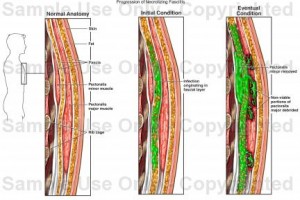
Picture 3 – Necrotizing Fasciitis Photo
Source – arcticboy
There are many causes of Necrotizing Fasciitis. However bacterial attack is the prime reason behind this disease. It is usually caused by different kinds of bacteria like Streptococcus Pyogenes and Staphylococcus aureus. The bacteria release toxins which activate the human immune system very powerfully. The toxin enters the bloodstream and starts damaging the surrounding tissues. These belong to “Group A” bacteria. Other bacteria of the same group include Vibrio vulnificus, Clostridium Perfringens and Bacteroides Fragilis. Some of these bacteria also cause other types of infection like Impetigo and Strep Throat. These bacteria usually cause mild infections but can also lead to more severe disorders in certain cases.
The disease may also be caused if an open wound comes in contact with salty ocean water. Raw oysters and saltwater fishes can also result in an infection of the skin upon physical contact.
Intestinal injuries, resulting from surgery or tumors or gunshots can also lead to this condition.
In some cases, a muscle strain or a bruise in the skin may also give rise to this disease.
Is Necrotizing Fasciitis Contagious?
The answer is yes! This infection can be transmitted from one person to another through physical contact. Physical contact with infected persons may cause this condition. Kissing the infected person or touching his or her wound can also make the uninfected person contract the infection. However, this mainly happens if the uninfected person suffers from chickenpox or low immunity or has an open wound.
Who gets Necrotizing Fasciitis?
The “Group A” bacteria generally infect people who have a low immunity, such as AIDS patients or diabetics. Having reduced immunity makes such people more prone to bacterial infections. This is why people with compromised immunity should use preventive measures to guard them against Necrotizing Fasciitis bacterial infection.
People with recently made, unclean, exposed wounds are also at a great risk from this condition.
Necrotizing Fasciitis Prevention
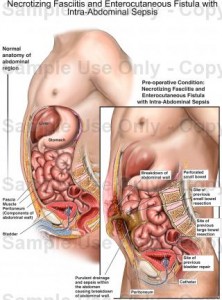
Picture 4 – Picture of Necrotizing Fasciitis
Source – complaintpromotion
People with or without low immunity should use these preventive steps to protect them from Necrotizing Fasciitis. These include :
Practicing Good Hygiene
Bathing regularly and wearing clean clothes and undergarments can help sufferers avoid bacterial infection of their skin.
Washing Hands
Good old hygiene is one of the best ways to combat this disorder. Clean your hands regularly, preferably with soap, to keep infections at bay.
Using Disinfectants
Use disinfectants almost immediately as soon as there is a cut or injury in your skin.
Necrotizing Fasciitis Diagnosis
Doctors normally diagnose the condition by observation and asking how quickly the symptoms have begun to appear. It is also noted how rapidly the infection is spreading. A sample of the infected tissue is examined to detect the presence of bacteria.
In some cases, an X-Ray, MRI scan or CT scan is also conducted on the patient to check the spread of infection or to see if any organ has been injured.
Necrotizing Fasciitis Treatment
Treating Necrotizing Fasciitis in initial stages is usually done with the aid of antibiotics. Intravenous antibiotic drugs like Penicillin, Clindamycin and Vancomycin are often used in combination as soon as the first symptoms are detected. Tissue culture is carried out to check the effect of antibiotics. A separate course of antibiotics may be administered depending on the results of the culture.
In acute Necrotizing Fasciitis cases, Hyperbaric Oxygen Treatment may be used. However, the treatment is not widely available and amputation of the affected part through surgical means may be necessary. Additional necrotic tissue also needs to be removed after such surgeries. Skin Grafting may also be required to treat the open wounds.
Necrotizing Fasciitis Pictures
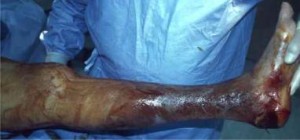
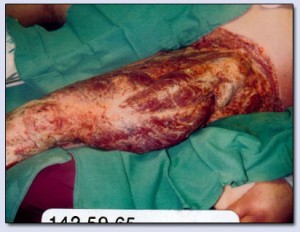
Picture 5 – Necrotizing Fasciitis Photo Picture 6 – Necrotizing Fasciitis Picture
Source – davidson.edu Source – uga.edu
Here are some pictures of Necrotizing Fasciitis. Go through these Necrotizing Fasciitis photos to see how the condition looks like. The Necrotizing Fasciitis images will also help you understand the symptoms of the disease much better.
Necrotizing Fasciitis Statistics
The infection is terrible in nature and has a high mortality rate, which can range from 25 to 73 percent.
Necrotizing Fasciitis is the cause of death in 1 out of every 4 sufferers. Fortunately, it is a very rare condition.
Only 600 cases of Necrotizing Fasciitis have been diagnosed in 1999 in the US. The condition continues to be the cause of about 600 people every year in the US.
Necrotizing Fasciitis is a very serious disease that can be life-threatening. If you see the symptoms of this condition in yourself or any person you know, you should seek medical assistance as soon as possible.
References:
http://en.wikipedia.org/wiki/Necrotizing_fasciitis
http://www.wisegeek.com/what-is-necrotizing-fasciitis.htm
http://www.webmd.com/a-to-z-guides/necrotizing-fasciitis-flesh-eating-bacteria-topic-overview?page=2
http://emedicine.medscape.com/article/784690-overview
http://www.medicinenet.com/necrotizing_fasciitis/page3.htm#symptoms
http://www.wrongdiagnosis.com/n/necrotizing_fasciitis/stats.htm
